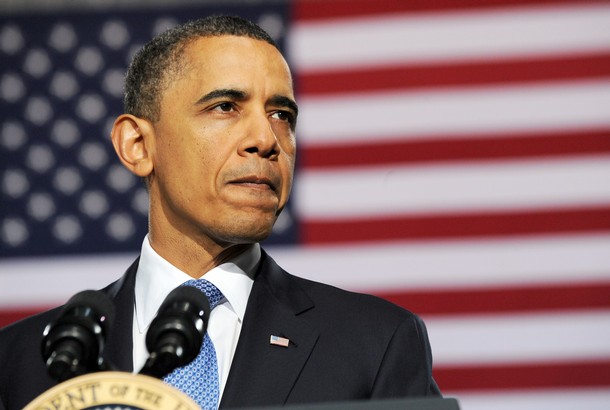
From the White House: Excerpt from President Barack Obama’s Address to the Nation on Libya, March 28, 2011.
Ten days ago, having tried to end the violence without using force, the international community offered Qaddafi a final chance to stop his campaign of killing, or face the consequences. Rather than stand down, his forces continued their advance, bearing down on the city of Benghazi, home to nearly 700,000 men, women and children who sought their freedom from fear.
At this point, the United States and the world faced a choice. Qaddafi declared he would show “no mercy” to his own people. He compared them to rats, and threatened to go door to door to inflict punishment. In the past, we have seen him hang civilians in the streets, and kill over a thousand people in a single day. Now we saw regime forces on the outskirts of the city. We knew that if we wanted — if we waited one more day, Benghazi, a city nearly the size of Charlotte, could suffer a massacre that would have reverberated across the region and stained the conscience of the world.
It was not in our national interest to let that happen. I refused to let that happen. And so nine days ago, after consulting the bipartisan leadership of Congress, I authorized military action to stop the killing and enforce U.N. Security Council Resolution 1973.
From Ryan Lizza, the New Yorker: As he campaigned in New Hampshire, in 2007, Obama said that he would not leave troops in Iraq even to stop genocide. “Well, look, if that’s the criteria by which we are making decisions on the deployment of U.S. forces, then by that argument you would have three hundred thousand troops in the Congo right now, where millions have been slaughtered as a consequence of ethnic strife, which we haven’t done,” he said. “We would be deploying unilaterally and occupying the Sudan, which we haven’t done. . . .”
On March 17th, I interviewed [Secretary of State Hillary] Clinton in Tunis. She was sitting under a canopy by the hotel pool, eating breakfast. Although she had been noncommittal with the diplomats in France two days earlier, she now made it clear that the Obama Administration had made a decision. It was well known that she favored intervention, but she was frank about the difficulty in making such decisions. “I get up every morning and I look around the world,” she said. “People are being killed in Côte d’Ivoire, they’re being killed in the Eastern Congo, they’re being oppressed and abused all over the world by dictators and really unsavory characters. So we could be intervening all over the place. But that is not a—what is the standard? Is the standard, you know, a leader who won’t leave office in Ivory Coast and is killing his own people? Gee, that sounds familiar. So part of it is having to make tough choices and wanting to help the international community accept responsibility.” (photo: Getty)
Image: getty%204%2017%2011%20Barack%20Obama.jpg
